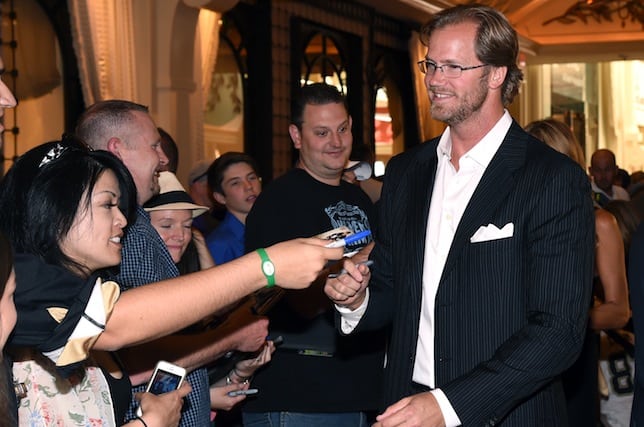
Hockey Hall of Fame clears path for Chris Pronger's immediate induction – and it's about time
Legendary defenseman Chris Pronger had his road to the Hockey Hall of Fame cleared Thursday after a report indicated the HHOF had altered its induction eligibility criteria. Injuries forced Pronger from the game in 2011, but salary cap issues prevented his induction – and this was the right move to make.
 Hockey Hall of Fame clears path for Chris Pronger's immediate induction – and it's about time
Hockey Hall of Fame clears path for Chris Pronger's immediate induction – and it's about timeAccording to an ESPN.com report, former NHL star defenseman Chris Pronger's road to the Hockey Hall of Fame was cleared Thursday when the HHOF's general voting members ratified changes to the induction eligibility criteria for players. The decision means it's possible Pronger will be welcomed into the HHOF's next group of honorees – and regardless of what you think of the process that led to this point, you can't argue the 40-year-old doesn't deserve to be acknowledged as one of the game's all-time great blueliners and competitors.
The report states one of the HHOF's new bylaws (No. 26, in this case) includes this section, which directly addresses Pronger's situation: "a person is not eligible for election in the player category if he or she has played in a professional or international hockey game (which terms shall not be considered to include games played only or primarily for charitable or recreational purposes, or for any other limited purpose that the Chair of the Board of Directors determines, in his or her discretion, should not disqualify for nomination a person otherwise eligible) during any of the three (3) playing seasons immediately prior to his or her election."
In effect, the new bylaw means that players such as Pronger – someone who everyone knows won't play again because of injuries, yet who doesn't file retirement papers because of salary cap issues – can be considered after the standard three-year period following their final game.
Under the HHOF's current rules, Pronger wouldn't have been eligible until 2020, three years after his contract with the Philadelphia Flyers expires.
With committee members' deadline to nominate potential inductees coming on April 15, there's no guarantee Pronger will receive the support needed to be welcomed as a member of the class of 2016. But while it's true it's not ideal to have Pronger still under a player's contract with the Flyers while he's being considered for induction into the HHOF, it's also important to remember he's not in this situation because of any illegal choice he made, either on the ice or when it came time to negotiate a contract. He didn't plan to have a career-ending concussion that forced him to hang up his skates more than four years ago, and punishing him for his employer trying to push the envelope of the NHL's salary cap system with a front-loaded contract would be as wrong as punishing him for pushing the envelope as a player.
No matter what you think of the way Pronger conducted himself on the ice, you have to give him his due for the impact he had on his teams and on often-incensed opponents. Few, if any defensemen of his or any generation have understood and approached the game as meticulously and obsessively as Pronger did in his 18 NHL seasons. He had an infamous mean streak, an economy of movement on the ice that allowed him to play half of each regulation time game without ever losing an edge, and he was a physical freak: his small feet made him nimble in a way most defensemen of his size (think Derian Hatcher) never were.
And if you're looking for the statistical information needed to justify Pronger's immediate induction into the HHOF, you don't have to turn to any advanced stat – or any personal info at all, for that matter. All you need to do is examine what happened to each of Pronger's teams after he left them to join another franchise: when he left St. Louis in 2004, the Blues went from a playoff team to missing the post-season the following year; when he left Edmonton after just one season, the Oilers changed from a Stanley Cup finalist to a team that missed the playoffs; when he left Anaheim in 2009 after three years and a Stanley Cup championship, the Ducks failed to qualify for the post-season in their first year without him; and after his injuries ended his career, the Flyers – you guessed it – didn't make the playoffs in their first post-Pronger campaign.
If that phenomenon had happened only once or twice, it might be easy to chalk it up to other factors. But go back and read that last paragraph again. It's astonishing, exceedingly rare, and a true indication of what Pronger brought to the table.
In a sense, Pronger getting into the HHOF under somewhat controversial circumstances is appropriate. He never shied away from controversy – some might say he basked in being the player opponents and fans loved to loathe – because he did everything in service of the side he was on. And again, that competitive fire that roared within him so hard for so long shouldn't be a strike against him now. He played to win and didn't care about making friends. This is why he was as dominant as anyone from his time.
Having the business side of the sport cast a shadow and delay the recognition of Pronger's unique hockey genius is more unfair than anything he did on the ice, and the sooner the HHOF corrects that with his induction, the better.







